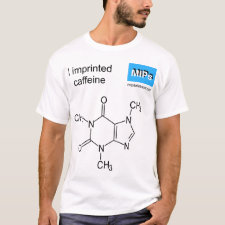
Authors: Ebarvia BS, Binag CA, Sevilla F
Article Title: Biomimetic piezoelectric quartz sensor for caffeine based on a molecularly imprinted polymer.
Publication date: 2004
Journal: Analytical and Bioanalytical Chemistry
Volume: 378
Issue: (5)
Page numbers: 1331-1337.
DOI: 10.1007/s00216-003-2433-9
Abstract: A piezoelectric quartz sensor coated with molecularly imprinted polymer (MIP) for caffeine was developed. The MIP was prepared by co-polymerizing methacrylic acid (MAA) and ethylene glycol dimethacrylate (EDMA) in the presence of azobis(isobutyronitrile) as initiator, caffeine as template molecule, and chloroform as solvent. The MIP suspension in polyvinyl chloride/tetrahydrofuran (6:2:1 w/w/v) solution was spin coated onto the surface of the electrode of a 10 MHz AT- cut quartz crystal. The sensor exhibited a linear relationship between the frequency shift and caffeine concentration in the range of 1x10(-7) mg mL(-1) up to 1x10(-3) mg mL(-1) [correlation coefficient (r)=0.9935] in a stopped flow measurement mode. It has a sensitivity of about 24 Hz/ln(concentration, mg mL(-1)). A steady-state response was achieved in less than 10 min. The performance characteristic of the sensor shows a promising and inexpensive alternative method of detecting caffeine. Surface studies were carried out for the reagent phase of the sensor using SEM, AFM, and XPS analysis in order to elucidate the imprinting of the caffeine molecule. The SEM micrograph, AFM image, and XPS spectra confirmed the removal of caffeine by Soxhlet extraction in the imprinting process and the rebinding of caffeine to the MIP sensing layer during measurement



Join the Society for Molecular Imprinting

New items RSS feed
Sign-up for e-mail updates:
Choose between receiving an occasional newsletter or more frequent e-mail alerts.
Click here to go to the sign-up page.
Is your name elemental or peptidic? Enter your name and find out by clicking either of the buttons below!
Other products you may like:
 MIPdatabase
MIPdatabase









